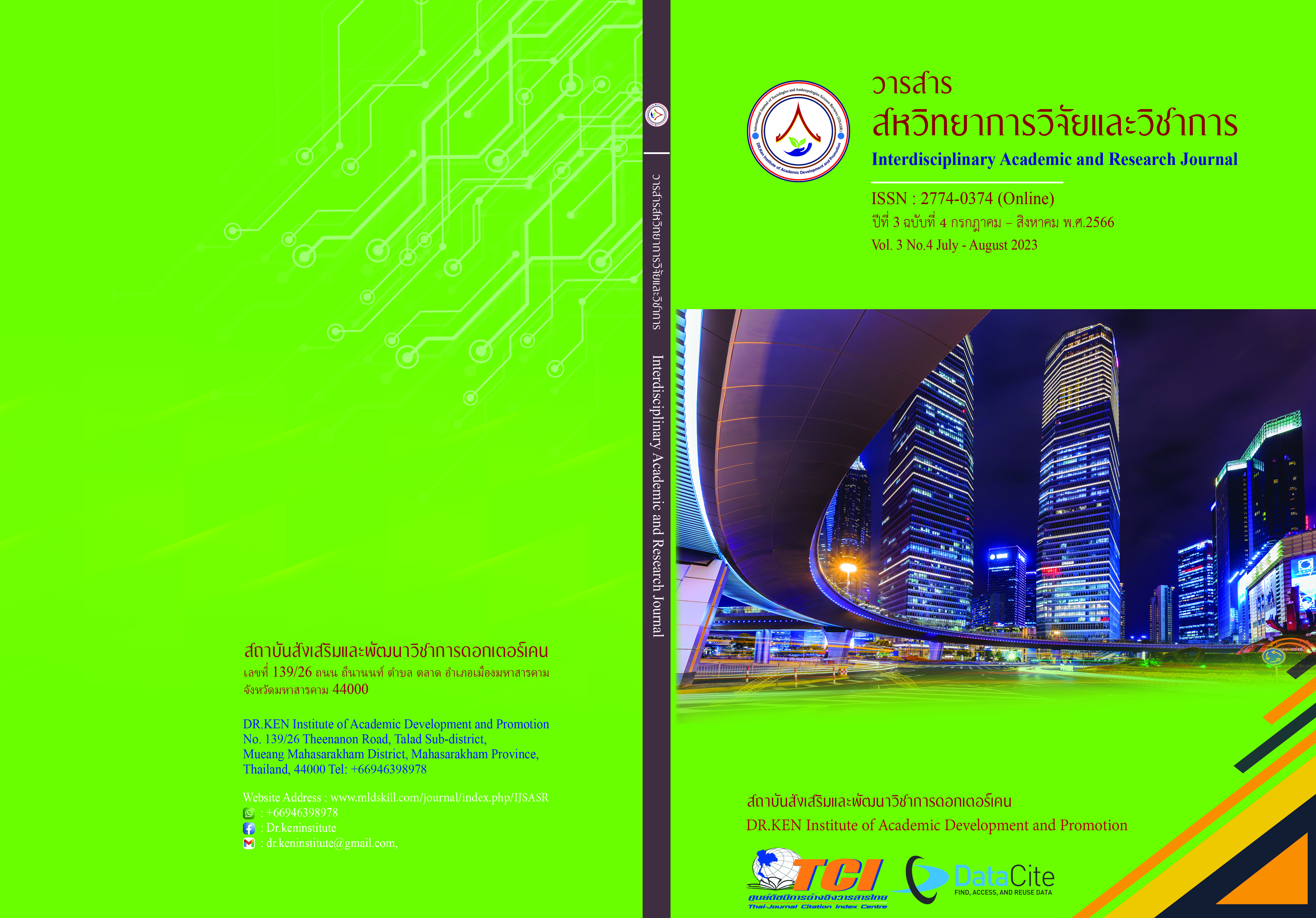The Development of a Program to Enhance the Ethical Leadership Qualities of Teachers under the Supervision of the Secondary Educational Service Area Office Khon Kaen
DOI:
https://doi.org/10.14456/iarj.2023.190Keywords:
Development of a Program; , Enhancing Program; , Ethical Leadership QualitiesAbstract
Ethical leadership is important because it enables the person in leadership to make decisions and guide actions based on sound ethical values, acting with professional ethics. They are the person who always does what is right, is honest, can be trusted, is respectable and good. Being an example of an ethical leader thus promoting ethical practices in the organization seriously makes them respect and trust in management. Thus, the aims of this research were as follows: 1) to study the current qualities, the desired qualities, and the requirements for enhancing the ethical leadership qualities of teachers under the supervision of the Secondary Educational Service Area Office Khon Kaen, and 2) to develop a program to enhance the ethical leadership qualities of teachers under the supervision of the Secondary Educational Service Area Office Khon Kaen by employing research and developmental methods. The study was conducted in two phases: Phase 1 involved studying the current qualities, the desired qualities, and the requirements for enhancing the ethical leadership qualities of teachers under the Secondary Educational Service Area Office Khon Kaen. The sample group, which was selected by stratified random sampling, consisted of 346 teachers and administrators under the supervision of the Secondary Educational Service Area Office Khon Kaen. The research tool, which was utilized, was a rating scale questionnaire. In Phase 2, a program was developed to enhance the ethical leadership qualities of teachers under the supervision of the Secondary Educational Service Area Office Khon Kaen, based on the best practices of six model schoolteachers and administrators. The program was created and evaluated by five qualified individuals, who had been purposively selected. The research methodology employed an assessment tool to evaluate the suitability and feasibility of the ethical leadership development program for teachers. The statistical analysis of the data consisted of frequencies, percentages, means, standard deviations, and the necessary index. The research findings indicated the following: (1) Overall, the current state of the ethical leadership qualities of teachers was high. The most desirable state of the ethical leadership qualities of teachers was at the highest level. The requirements of the ethical leadership qualities of teachers were ranked in descending order as follows: being effectiveness-oriented, being respectful, being public-minded, being fair, being responsible, and being honest. (2) The ethical leadership development program for teachers, under the supervision of the Secondary Educational Service Area Office Khon Kaen, was comprised of 1) principles and importance, 2) objectives, 3) content, 4) developmental methods, and 5) evaluation & assessment. The program comprised six Module-s: Module-1: Fairness, Module-2: Honesty, Module-3: Responsibility, Module-4: Public-mindedness, Module-5: Effectiveness-orientation, and Module-6: Respect. Overall, the results of the program evaluation indicated high suitability and the highest feasibility.
References
กมลชนก ราชสง. (2565). ภาวะผู้นำเชิงจริยธรรมของผู้บริหารสถานศึกษาสังกัดสำนักงานเขตพื้นที่การศึกษาประถมศึกษาสุราษฎร์ธานี เขต 3. วิทยานิพนธ์ศึกษาศาสตร์มหาบัณฑิต, มหาวิทยาลัยหาดใหญ่.
กัญญาภัค ไข่เพชรและ จุฬาพรรณภรณ์ ธนะแพทย์. (2565). ภาวะผู้นำเชิงจริยธรรมของผู้บริหารสถานศึกษาในยุคศตวรรษที่ 21. วารสาร มจร อุบลปริทรรศน์, 7(2), 51-64.
กันยมาส ชูจีน. (2559). ปัจจัยที่ส่งผลต่อภาวะผู้นำเชิงจริยธรรมของผู้บริหารสถานศึกษาขั้นพื้นฐาน สังกัดสำนักงานคณะกรรมการการศึกษาขั้นพื้นฐาน: โมเดลสมการโครงสร้าง. ดุษฎีนิพนธ์ปรัชญาดุษฎีบัณฑิตแขนงวิชาการบริหารการศึกษา สาขาวิชาศึกษาศาสตร์มหาวิทยาลัยสุโขทัยธรรมาธิราช.
ข้อบังคับคุรุสภา ว่าด้วยจรรยาบรรณของวิชาชีพ พ.ศ. 2556. (2556, 19 กันยายน). ราชกิจจานุเบกษา. เล่ม 130 ตอนพิเศษ 130 ง. หน้า 72-74.
ชัยเสฏฐ์ พรหมศรี. (2561). ภาวะผู้นำสำหรับผู้บริหารองค์การ: แนวคิด ทฤษฎีและกรณีศึกษา. กรุงเทพฯ: ปัญญาชน.
ชุติมา รักษ์บางแหลม, เอกรินทร์ สังข์ทอง, ชวลิต เกิดทิพย์ และชิดชนก เชิงเชาวน์. (2559). ภาวะผู้นำเชิงจริยธรรม: หนทางสู่การขับเคลื่อนภาวะผู้นำในสถาบันศึกษา. วารสารมหาวิทยาลัยนราธิวาสราชนครินทร์, 8(1),168-180.
ประมวลจริยธรรมข้าราชการครูและบุคลากรทางการศึกษา. (2564). ราชกิจจานุเบกษา. เล่ม 138 ตอนพิเศษ 213ง ลงวันที่ 9 กันยายน 2564
พระราชบัญญัติการศึกษาแห่งชาติ พ.ศ. 2542. (2542, 19 สิงหาคม). ราชกิจจานุเบกษา. เล่ม 116 ตอนที่ 74 ก. หน้า 1-23.
พระราชบัญญัติระเบียบข้าราชการครูและบุคลากรทางการศึกษา พ.ศ. 2547. (2547, 23 ธันวาคม). ราชกิจจานุเบกษา. เล่ม 121 ตอนพิเศษ 79 ก. หน้า 22-74.
ภาณุวัฒน์ บุญธัญกิจ. (2563). ภาวะผู้นำเชิงจริยธรรมที่พึงประสงค์ของผู้บริหารสถานศึกษา สังกัด กรุงเทพมหานครตามทัศนะของผู้บริหารและครู. วิทยานิพนธ์ปริญญาศึกษาศาสตรมหาบัณฑิต, มหาวิทยาลัยธุรกิจบัณฑิตย์.
ราชบัณฑิตยสถาน. (2554). พจนานุกรมฉบับราชบัณฑิตยสถาน พ.ศ. 2554. กรุงเทพฯ: ราชบัณฑิตยสถาน.
สำนักงานเขตพื้นที่การศึกษามัธยมศึกษาขอนแก่น. (2565). ข้อมูลสารสนเทศทางการศึกษา สำนักงานเขตพื้นที่การศึกษามัธยมศึกษาขอนแก่น ปีการศึกษา 2565 [เอกสารที่ไม่ได้ตีพิมพ์]. กลุ่มนโยบายและแผน, สำนักงานเขตพื้นที่การศึกษามัธยมศึกษาขอนแก่น
สำนักงานคณะกรรมการการศึกษาขั้นพื้นฐาน. (2553). แนวทางการพัฒนา การวัดและประเมิน คุณลักษณะอันพึงประสงค์ ตามหลักสูตรแกนกลางการศึกษาขั้นพื้นฐาน พุทธศักราช 2551. พิมพ์ครั้งที่ 2. กรุงเทพฯ: โรงพิมพ์ชุมนุมสหกรณ์การเกษตรแห่งประเทศไทย จำกัด.
สำนักงานคณะกรรมการข้าราชการครูและบุคลากรทางการศึกษา. (2564). รายงานประจำปีเกี่ยวกับ การบริหารงานบุคคลของข้าราชการครูและบุคลากรทางการศึกษา ประจำปีงบประมาณ พ.ศ. 2564. กรุงเทพฯ: สำนักงานคณะกรรมการข้าราชการครูและบุคลากรทางการศึกษา.
สำนักงานคณะกรรมการข้าราชการพลเรือน. (2553). คู่มือการกำหนดสมรรถนะในราชการพลเรือน: คู่มือสมรรถนะหลัก. นนทบุรี: ประชุมช่าง.
สำนักงานคณะกรรมการข้าราชการพลเรือน. (2563). การจัดทำประมวลจริยธรรมและข้อกำหนดจริยธรรม. นนทบุรี: สำนักงานคณะกรรมการข้าราชการพลเรือน.
สำนักงานเลขาธิการสภาการศึกษา. (2561). การวิจัยและพัฒนารูปแบบ กลไกการเสริมสร้างวิรัยในสถานศึกษา ระดับการศึกษาขั้นพื้นฐาน ด้านความรับผิดชอบและการตรงต่อเวลา. กรุงเทพฯ: พริกหวานกราฟฟิค.
สุวัฒน์ จุลสุวรรณ์. (2554). พัฒนาภาวะผู้นำการเปลี่ยนแปลงผู้บริหารสายสนับสนุนสถาบันการศึกษาของรัฐ. วิทยานิพนธ์ปริญญาการศึกษาดุษฎีบัณฑิต, มหาวิทยาลัยมหาสารคาม.
อนันธิตา เอียดบัวขวัญ. (2563). ภาวะผู้นำเชิงจริยธรรมของผู้บริหารที่มีความสัมพันธ์กับผลการดำเนินงานระบบดูแลช่วยเหลือนักเรียนของโรงเรียนราชประชานุเคราะห์ 5 จังหวัดชายแดน ภาคใต้. วิทยานิพนธ์ศึกษาศาสตร์มหาบัณฑิต, มหาวิทยาลัยหาดใหญ่.
อาภรณ์ ภู่วิทยพันธ์. (2559). การพัฒนาขีดความสามารถของบุคลากรบนพื้นฐาน 70: 20: 10 Learning Model. กรุงเทพฯ: เอช อาร์ เซ็นเตอร์.
Krejcie, R.V., & Morgan, D. W. (1970). Determining sample size for research activities. Educational and Psychological Measurement, 30(3), 607–610.
Sims, R.R., & Brinkmann, J. (2002). Leaders as Moral Role Models: The Case of John Gutfreund at Salomon Brothers. Journal of Business Ethics, 35(4), 327-339.
Treviño, L.K., & et al., (2003). A Qualitative Investigation of Perceived Executive Ethical Leadership: Perceptions from Inside and Outside the Executive Suite. Human Relations, 56(1), 5-37.
Moore, B.D., (2022). What is ethical leadership? principles & examples. Great work life. Retrieved on May 9, 2022, from https://www.greatworklife.com/ what-is-ethical-leadership-decision-framework/
Downloads
Published
How to Cite
Issue
Section
License
Copyright (c) 2023 Rachai Namwongsa, Surachat Noirit

This work is licensed under a Creative Commons Attribution-NonCommercial-NoDerivatives 4.0 International License.
Copyright on any article in the Interdisciplinary Academic and Research Journal is retained by the author(s) under the under the Creative Commons Attribution-NonCommercial-NoDerivatives 4.0 International License. Permission to use text, content, images, etc. of publication. Any user to read, download, copy, distribute, print, search, or link to the full texts of articles, crawl them for indexing, pass them as data to software, or use them for any other lawful purpose. But do not use it for commercial use or with the intent to benefit any business.
















.png)


